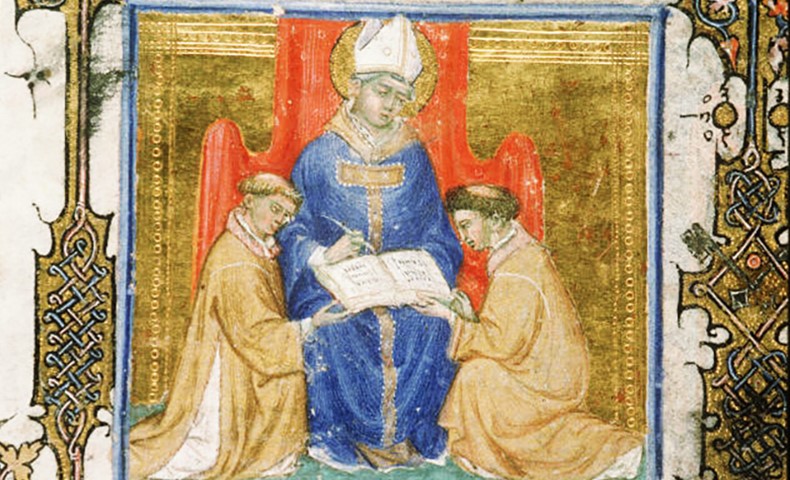– Anastasios
With Saint Hilary of Arles we find ourselves in the 5th century, a time when the Church was still organizing her structures after the freedom that was given to her in the previous century, but also facing evident threatens from outside (barbarians) and inside (heresies).
Hilary (403-449) was from a well off family. He was fond of studying and was especially very interested in philosophy. His youth was after the pleasure of the world, as many other young men of his time. But then a relative of him, who was Bishop of Arles (France) was a decisive impulse for him to decide to become a monk. In 429 he was successor to the Bishopric of Arles. He was an admirer of Saint Augustine and a great defender of the faith.
Catholic Encyclopedia thus speaks about some of his actions: “A reunion of bishops, over which he presided in 444 and at which were present St Eucherius of Lyons and St Germain of Auxerre, deposed for incapacity provided against by the canons a certain Cheldonius. The latter hastened to Rome, was successful in pleading his cause before the pope, and consequently was reinstated in his see. Hilary then sought St Leo in order to justify his course of action in the matter, but he was not well received by the sovereign pontiff and was obliged to return precipitately to Gaul. Several priests afterwards sent by him to Rome to explain his conduct met with no better success. Moreover, several persons who were hostile towards him profited by this juncture to bring various accusations against him at the Court of Rome, whereupon the pope excommunicated Hilary, transferred the prerogatives of his see to that of Fréjus, and caused the proclamation by the Emperor Valentinian III of that famous decree which freed the Church of Vienne from all dependence on that of Arles. Nevertheless there is every reason to believe that, the storm once passed, peace was rapidly restored between Hilary and Leo. We are too far removed from the epoch in which this memorable quarrel occurred, and the documents which might throw any light on it are too few to allow us to form a definitive judgment on its causes and consequences. It evidently arose from the fact that the respective rights of the Court of Rome and of the metropolitan were not sufficiently clearly established at that time, and that the right of appeal to the pope, among others, was not explicitly enough recognized. There exist a number of writings which are ascribed to St Hilary, but they are far from being all authentic. Père Quesnel collected them all in an appendix to the work in which he has published the writings of St. Leo.” (Clugnet, L. (1910). St. Hilary of Arles. In The Catholic Encyclopedia. From New Advent: http://www.newadvent.org/cathen/07349a.htm).
I am quite sure that Hilary would be in agreement with his so admired Augustine, when the latter, in his Confessions (X) said: “And from You, O Lord, unto whose eyes the depths of man’s conscience are naked (Hebrews 4:13), what in me could be hidden though I were unwilling to confess to You? For so should I hide You from myself, not myself from You. But now, because my groaning witnesses that I am dissatisfied with myself, Thou shinest forth, and satisfiest, and art beloved and desired; that I may blush for myself, and renounce myself, and choose You, and may neither please You nor myself, except in You. To You, then, O Lord, am I manifest, whatever I am, and with what fruit I may confess unto You I have spoken. Nor do I it with words and sounds of the flesh, but with the words of the soul, and that cry of reflection which Your ear knows. For when I am wicked, to confess to You is naught but to be dissatisfied with myself; but when I am truly devout, it is naught but not to attribute it to myself, because Thou, O Lord, bless the righteous; but first Thou justify him ungodly (Romans 4:5). My confession, therefore, O my God, in Your sight, is made unto You silently, and yet not silently. For in noise it is silent, in affection it cries aloud. For neither do I give utterance to anything that is right unto men which You have not heard from me before, nor do You hear anything of the kind from me which Yourself said not first unto me.” Probably Hilary would agree that these words can also be rightly considered his own words.


 Follow
Follow


